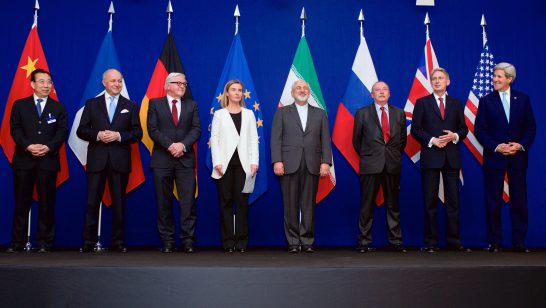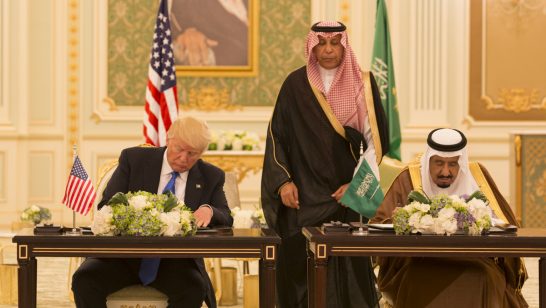
This article was originally published in Russian in Kommersant.
Merely listing the people who advised the United States against challenging the nuclear deal with Iran (the JCPOA) would take the rest of this column. Numerous leaders, diplomats, and experts, including EU-based and Russian members of our organization, the European Leadership Network, expressed their support[1] for continuation of the agreement. It puts significant, even if time-limited, constraints on the development of Iran’s nuclear program and provides strong safeguards against cheating. Even senior members of the Trump Administration reportedly prefer to uphold the JCPOA.
Yet we are in the middle of a major crisis. In his 13 October “de-certification” decision President Trump did not immediately restore suspended US sanctions or impose fresh ones. And it is not certain that the US Congress will act on President Trump’s invitation to pull out of the JCPOA or impose further stiff US conditions. But the hostility towards both Iran and the nuclear deal evident in the President’s announcement and the accompanying new US strategy on Iran has already invited condemnation and may provoke more hardline reaction from Tehran. It diminishes the political space for progress towards better relations between Iran and the international community. And it leaves the JCPOA permanently vulnerable to US political spasms.
It is important to note that President’s “de-certification” does not allege Iranian violations of the JCPOA. That would be hard to claim while the IAEA continues to find Iran in full compliance. Instead, President Trump is saying that he cannot any longer certify that the deal is in US national security interests. He justifies this using a range of arguments about Iran’s regime and its policies in Syria, Lebanon, Afghanistan, and the Gulf region.
It will be for Congress to decide whether to re-impose the most important sanctions. It is most likely that the US would start with threatening to restore sanctions in an attempt to pressure Iran to re-negotiate the deal. Only then would sanctions be re-introduced, maybe in a modified form, or difficult unilateral new conditions imposed. At the same time, the critics of the deal hope that, somewhere along the way, Iran will over-react and quit the deal or do something stupid – such as resume higher level uranium enrichment or strike against US forces in the region, giving the US a perfect excuse to toughen its policy.
For the members of the European Union, who have supported a diplomatic resolution of the nuclear crisis with Iran since 2003 and have played a crucial part in reaching the JCPOA in 2015, US willingness to seek a direct confrontation with Iran looks like the wrong strategy, especially at a time of nuclear crisis with North Korea. They are not starry-eyed about Tehran. But they do not see Iran as the ultimate villain or as the only obstacle to a peaceful and prosperous Middle East. The region is much more complicated than that. They also judge that re-opening the JCPOA won’t result in a “better” deal, but rather will lead Iran back to the position of a nuclear threshold state, with enough nuclear material, infrastructure and expertise to produce nuclear weapons in weeks. In the process, as US-Iran confrontation escalated, the Middle East would become an even more dangerous and chaotic place, as we can see in the latest escalation of Saudi-Iran tensions. From a European perspective, it looks like the US has a good plan for how to start a crisis, but little or no idea about what may result from it.
Some in the US seem to hope that the threat of US sanctions will force the Europeans to join the US and cut links with Iran, not out of conviction but in order to maintain transatlantic unity and to protect European businesses. This time, however, the US may be overplaying its hand. It is true that the business links with the US matter to Europe much more than trade with Iran, but US actions compromise very basic European rules: that pacta sunt servanta (the deals must be kept) and that diplomacy should come before force. This is the message that European politicians and diplomats have delivered in Washington, including Federica Mogherini who during her visit to the US this week called the potential dismantlement of the deal “irresponsible”.
All of this draws the EU countries, Russia and China closer together as JCPOA signatories. Tactical coordination of positions is already under way. We should focus on sending a clear signal to Washington about the damage that US actions can do. Even after de-certification, there’s still time for diplomacy to work before irreparable harm is done, and we all share the same goal of preserving the JCPOA. There is also scope for a certain ‘division of labour’, with the EU working to influence Washington and Russia working to persuade Iran to stay in the JCPOA.
With regards to broader EU – Russia relations, we would caution against drawing conclusions that are too far-reaching. Yes, a US-EU split over Iran may encourage Europeans to adopt more assertive foreign and security policy positions and not just over Iran. But no, there will be no immediate transatlantic divorce and this crisis will not make the EU more likely to seek closer partnership with Russia. The EU will still expect Moscow to show the same respect for the existing rules of international behavior in Europe as it expects the US to show in its dealings with Iran.
[1] See: http://www.europeanleadershipnetwork.org/eln-group-statement-sustaining-the-iran-nuclear-deal-_5108.html
The opinions articulated above represent the views of the author(s), and do not necessarily reflect the position of the European Leadership Network or any of its members. The ELN’s aim is to encourage debates that will help develop Europe’s capacity to address the pressing foreign, defence, and security challenges of our time.




